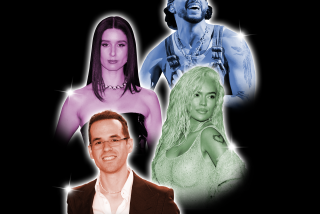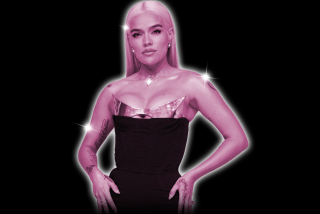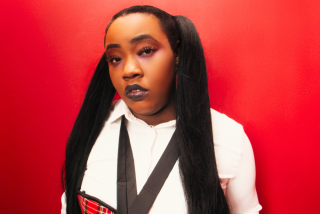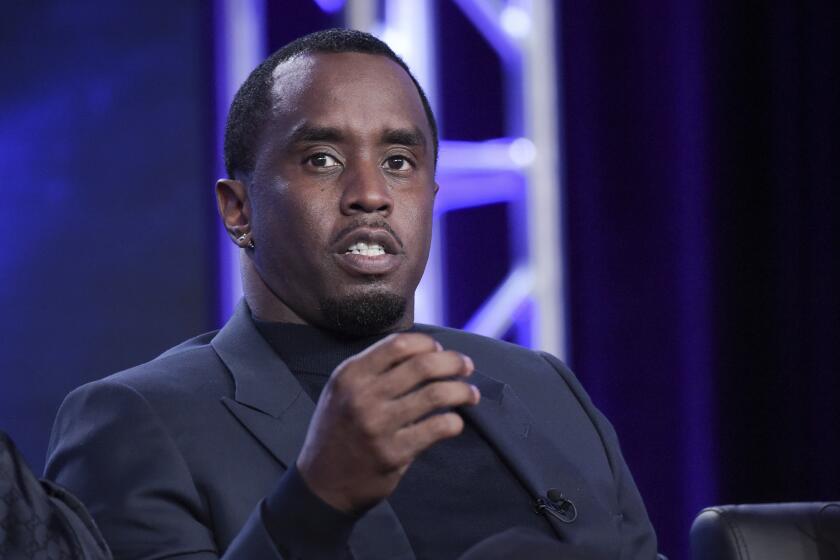In a Latin genre dominated by men, reggaeton ‘bichota’ Karol G takes aim at the top
“It’s so much fun being the bad girl,” Karol G says. “In the movies, I think people remember the villains best.”
For the Colombian pop-reggaeton star, being “bad” consists of a few things that aren’t terribly negative, unless you’re a woman: racing across the city in your flashy new car, getting reckless on the dance floor with your girlfriends or sporting a revealing new outfit, just in case you stumble on your ex. Such is the life Karol leads as a “Bichota,” which is the title of her most recent hit: Spanglish slang that’s roughly equivalent to hip-hop’s “bad bitch,” or an “empowered, strong woman” in Karol’s words.
“There is no way to say it prettily,” she says. “You have to say it with force and with attitude. Bichota.”
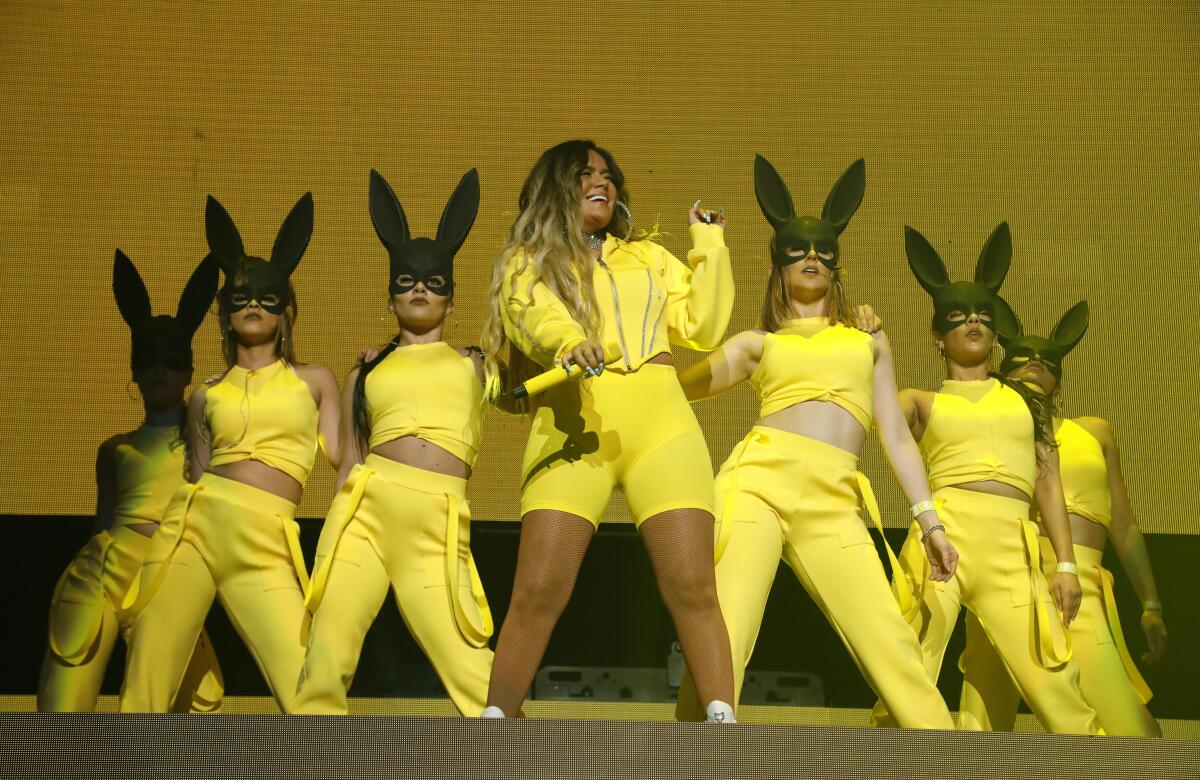
Video-conferencing from her apartment in Miami, the Latin Grammy-winning artist is still winding down from her 30th birthday, which falls on Valentine’s Day. She celebrated by motocross racing in the Dominican Republic with her family, then came home and bought herself a white Ferrari Spider 812 GTS. 2021 promises to be a pivotal year for Karol: Her new studio album, “KG0516,” released Friday, takes aim at the kind of rarified crossover stardom enjoyed exclusively by male Latin MCs like Daddy Yankee, Bad Bunny and J Balvin. “For years, I heard that women do not do reggaeton,” she says. “Reggaeton and urban music belong to men, but as a woman, you belong to men.
“Women are on a whole other level now,” she adds. “We are well prepared to lead. We’ve earned it, and we will fight for it.”

“KG0516” is Karol’s first record as coproducer, and it features collaborations with Nicki Minaj, Balvin and Ozuna. Spelled out like a flight number, the “0516” corresponds to May 16, 2006, the day the performer signed her first record deal as Karol G. Karol grew up Carolina Giraldo Navarro, the youngest child in a middle-class family in Medellín, a sprawling metropolis in the heart of the Andes Mountains. Her father, music manager Juan Guillermo Giraldo, helped shepherd her through her burgeoning music career in Colombia, landing her a role in the country’s spinoff of “The X-Factor” and eventually a quinceañera gig where she first met and opened for future collaborator Balvin.
Karol closely studied not only the pop-R&B sensibilities of contemporary anglophone divas like Rihanna, Alicia Keys and Amy Winehouse but also the tao of reggaeton godfathers El General and Tego Calderón. In pooling together her influences, Karol emerged with the silken, laid-back flow of a girl who grew up on island music. “I can easily make a cumbia or a ballad, because I enjoy them just the same,” Karol says of her style. “But when I started making music in 2006, there was already a very strong reggaeton movement in Latin America. The music I wanted to make was the music I loved listening to.”
In the 2000s, however, women in reggaeton were few and far between. In early talks with Universal Latin, Karol says, one executive tried to steer her away from the genre; the now-renowned Puerto Rican MC Ivy Queen was both reggaeton’s most visible and its most despised woman, whose feminist verses were met by sexist attacks on her appearance and her smoky contralto. (Karol invited Ivy back to revive her 2002 classic “Quiero Bailar” on the nostalgic “KG0516” cut “Leyendas.”)
Karol carefully earned street cred as the pop-adjacent sidekick to male artists like Reykon, Nicky Jam and Ozuna. Her 2017 major-label debut, “Unstoppable,” featured her now diamond-status breakout single with Bad Bunny, “Ahora Me Llamas.” Then, on her sophomore LP, “Ocean,” Karol established her staying power as a solo artist on its lead single, “Mi Cama,” or “My Bed” — an instant reggaeton classic sealed with a squeaky horn sample, emulating the bounce of a bed frame when making love. She followed “Mi Cama” with 2018’s “Punto G,” an ode to a particular erogenous zone.
That same year, Karol was named best new artist at the Latin Grammys, and an increasing number of women surfaced in the commercial reggaeton scene. Spanish flamenco artist Rosalía featured on multiple Balvin tracks, and Dominican singer-rapper Natti Natasha and SoCal sweetheart Becky G made waves with their joint hit, “Sin Pijama.” The half-Dominican Cardi B even entered the fray, featuring in two major Latin hits in 2019: “I Like It” with Balvin and Bad Bunny, and DJ Snake’s “Taki Taki” with Ozuna and Selena Gomez. Still, few Latinas were able to achieve the same crossover magic as their male counterparts, who rose to the upper echelons of the Billboard Hot 100 with Spanish-language tracks like “Despacito” and “Mi Gente.”
“I can’t say it was easy for [male] artists to crossover,” says Alessandra Alarcon, who in 2019 became the first female president of the Spanish Broadcasting System and who oversees several Latin music radio stations in the U.S., including in Puerto Rico. “Daddy Yankee had a huge hit in 2005 with ‘Gasolina,’ but he was well into his career when ‘Despacito’ came out. I think female artists need to get into the same zone [and collaborate with each other]. Female talent should act as allies in the industry. It is a more powerful message when it is said in unison.”
The uninhibited sexual lyricism that is essential to reggaeton also poses a challenge to audiences in Latin America — more so when performed by women. The number of Latinas in the genre has seemed to grow in tandem with a feminist movement that spans from Mexico to Argentina, where women have stormed the streets demanding an end to rampant sexual violence, femicide and laws restricting reproductive autonomy. “I once had an interview in Mexico,” recounts Karol, who identifies as a feminist. “I will never forget how the journalist asked, ‘Why would you, as a woman, talk about how your bed squeaks?’ Like with shame. It made me very sad that she’d start with that. ‘What a pity,’ I thought. ‘I guess your bed doesn’t squeak.’”
Karol rarely sought other women as collaborators before 2019, when she tapped Trinidadian American rap queen Minaj to write verses for “Tusa,” or “Heartbreak.” The two first corresponded through private messages on Instagram, where they traded notes and recordings for the song that became Karol’s biggest hit, with more than 1 billion YouTube views. “My whole mentality on the industry changed when Nicki gave me [a chance],” she says.
“It’s not that there are so few women in the genre, but it’s about letting new women participate,” says Karol, who lends airtime to rising stars Mariah Angeliq and Nathy Peluso on “KG0516.” The experience also inspired Karol to host her own female-centric Apple Music show, aptly titled “Bichota Radio,” which will spotlight Latinas like Colombian American rising star Kali Uchis and Argentine MC Nicki Nicole. “If we keep this up,” she says, “I think radio’s going to sound really different a year from now.”

Much like the eccentric superstar Bad Bunny, Karol hopes to establish herself as a Latin pop auteur with “KG0516,” shaking and stirring whatever sound comes to her. Joined by Balvin and Puerto Rican rapper Anuel AA, Karol cosplays a cowgirl in the video for her western-themed song “Location,” which fuses American country music, dance pop and Latin trap. On her latest single, “El Barco,” or “The Ship,” currents of bossa nova and bachata riffs, played by Aventura guitarist Lenny Santos, flow delicately in conversation with her forlorn verses, informing an ex-lover that their ship has sailed. “There are neither sad endings nor happy endings,” she sings, “but I do believe in new beginnings.”
“El Barco” and other breakup songs on “KG0516” have further fueled speculation regarding Karol’s relationship with frequent collaborator Anuel AA, whom she began dating in 2018. This month, Univision reported that the couple had split, citing both anonymous sources and the couple’s waning social media presence as evidence. “Anuel and I decided to move away from social media because we became a target,” Karol says. “If something definitive were to happen, we are going to be the ones to communicate it.”
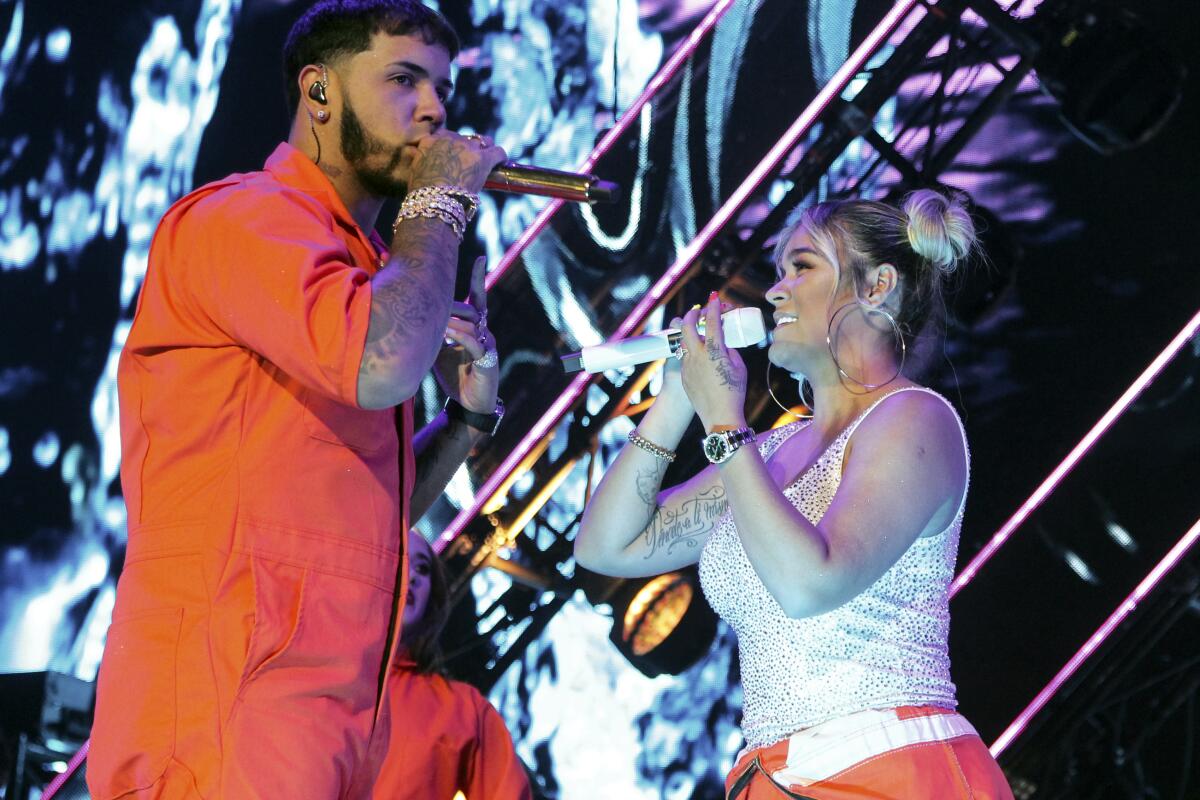
More intriguing than the relationship rumors is the album cover for “KG0516.” In the David LaChapelle photo, Karol wears thin Coolio braids and stands beside a Black man reclined in the nude — a model named Quinten Barnard — whose private parts are obscured by a toy airplane. She describes it as her “dream cover.”
“I told David that I wanted to look like a powerful leader, but I also wanted to look cool. [The result] fascinated me... The gender roles are reversed. Now I have the power, I am the voice. Because it was always the other way around.”
Female empowerment rhetoric has its limits, though, when a woman’s power relies on the disempowerment of others. Karol’s musical lineage, and that of reggaeton, leans heavily on the influence of Black people in the Caribbean; yet save for Ozuna, reggaeton’s most popular artists are non-Black Latinos.
Race has been a sticky subject for Karol G. Amid the protests after the police killing of George Floyd, she posted a photo of her black and white bulldog, Goku, calling it “a perfect example of black and white together in harmony.”
“I did wrong with my photo, and the lesson cost me a lot,” she says. “You don’t know how much I cried. I disappeared from social media for a month. But having offended people by saying something so ignorant, it was also my opportunity to understand it better. I talked to Becky G, who shared articles and videos about George Floyd, Breonna Taylor... I just grew up in such privilege [as a mestiza woman, she’s part of a majority in Colombia] that I didn’t understand the [scale of] racism. To tell you the truth, I used to be a little scared to talk about it, but I’m learning now.”
Uncomfortable as it may be, Karol’s stumbles remain critical components to her journey as an artist. She’s coming to fame in an era when gender and racial parity are not just buzzwords but also principles demanded by a new generation of listeners.
“I believe in what people are fighting for today, for rights, for equality,” she says. “But I understand now as a leader, I have to be better connected.”
More to Read
The biggest entertainment stories
Get our big stories about Hollywood, film, television, music, arts, culture and more right in your inbox as soon as they publish.
You may occasionally receive promotional content from the Los Angeles Times.
